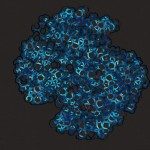Lien vers Pubmed [PMID] – 12902215
Appl. Environ. Microbiol. 2003 Aug;69(8):4352-8
The stationary-phase-inducible sigma factor, sigma(S) (RpoS), is the master regulator of the general stress response in Salmonella and is required for virulence in mice. rpoS mutants can frequently be isolated from highly passaged laboratory strains of Salmonella: We examined the rpoS status of 116 human clinical isolates of Salmonella, including 41 Salmonella enterica serotype Typhi strains isolated from blood, 38 S. enterica serotype Typhimurium strains isolated from blood, and 37 Salmonella serotype Typhimurium strains isolated from feces. We examined the abilities of these strains to produce the sigma(S) protein, to express RpoS-dependent catalase activity, and to resist to oxidative stress in the stationary phase of growth. We also carried out complementation experiments with a cloned wild-type rpoS gene. Our results showed that 15 of the 41 Salmonella serotype Typhi isolates were defective in RpoS. We sequenced the rpoS allele of 12 strains. This led to identification of small insertions, deletions, and point mutations resulting in premature stop codons or affecting regions 1 and 2 of sigma(S), showing that the rpoS mutations are not clonal. Thus, mutant rpoS alleles can be found in freshly isolated clinical strains of Salmonella serotype Typhi, and they may affect virulence properties. Interestingly however, no rpoS mutants were found among the 75 Salmonella serotype Typhimurium isolates. Strains that differed in catalase activity and resistance to hydrogen peroxide were found, but the differences were not linked to the rpoS status. This suggests that Salmonella serotype Typhimurium rpoS mutants are counterselected because rpoS plays a role in the pathogenesis of Salmonella serotype Typhimurium in humans or in the transmission cycle of the disease.

